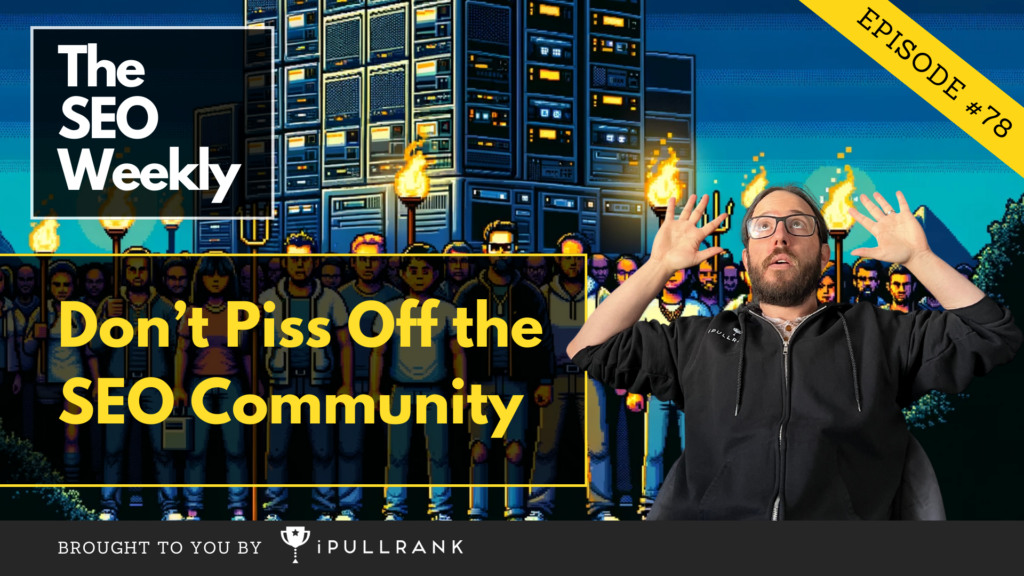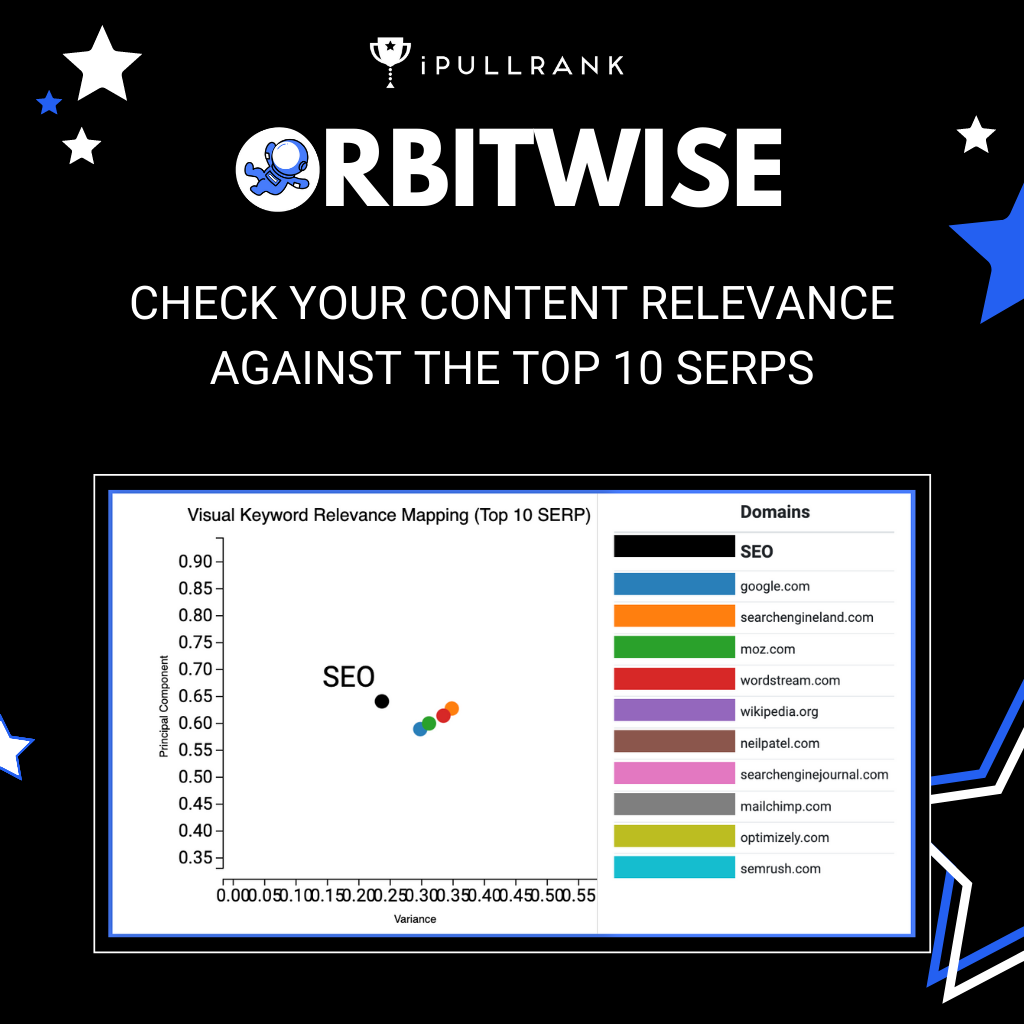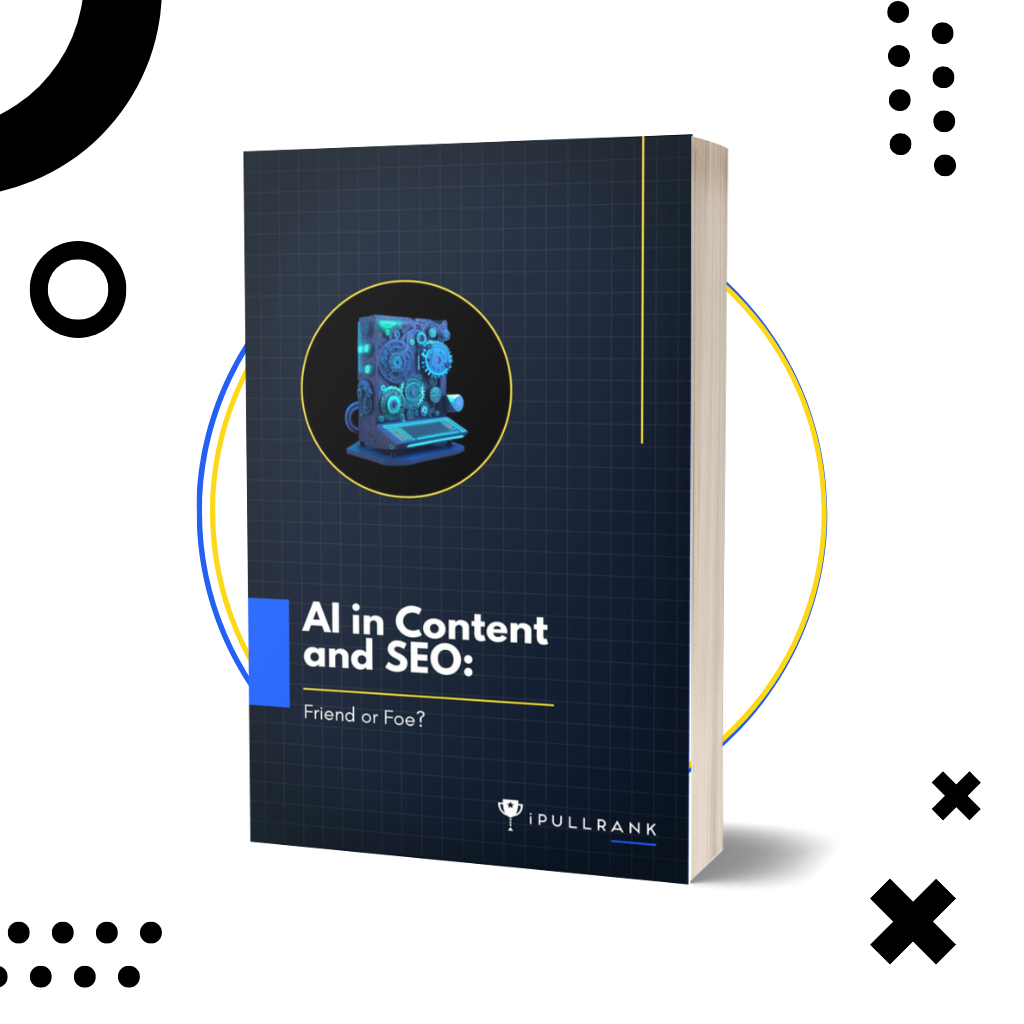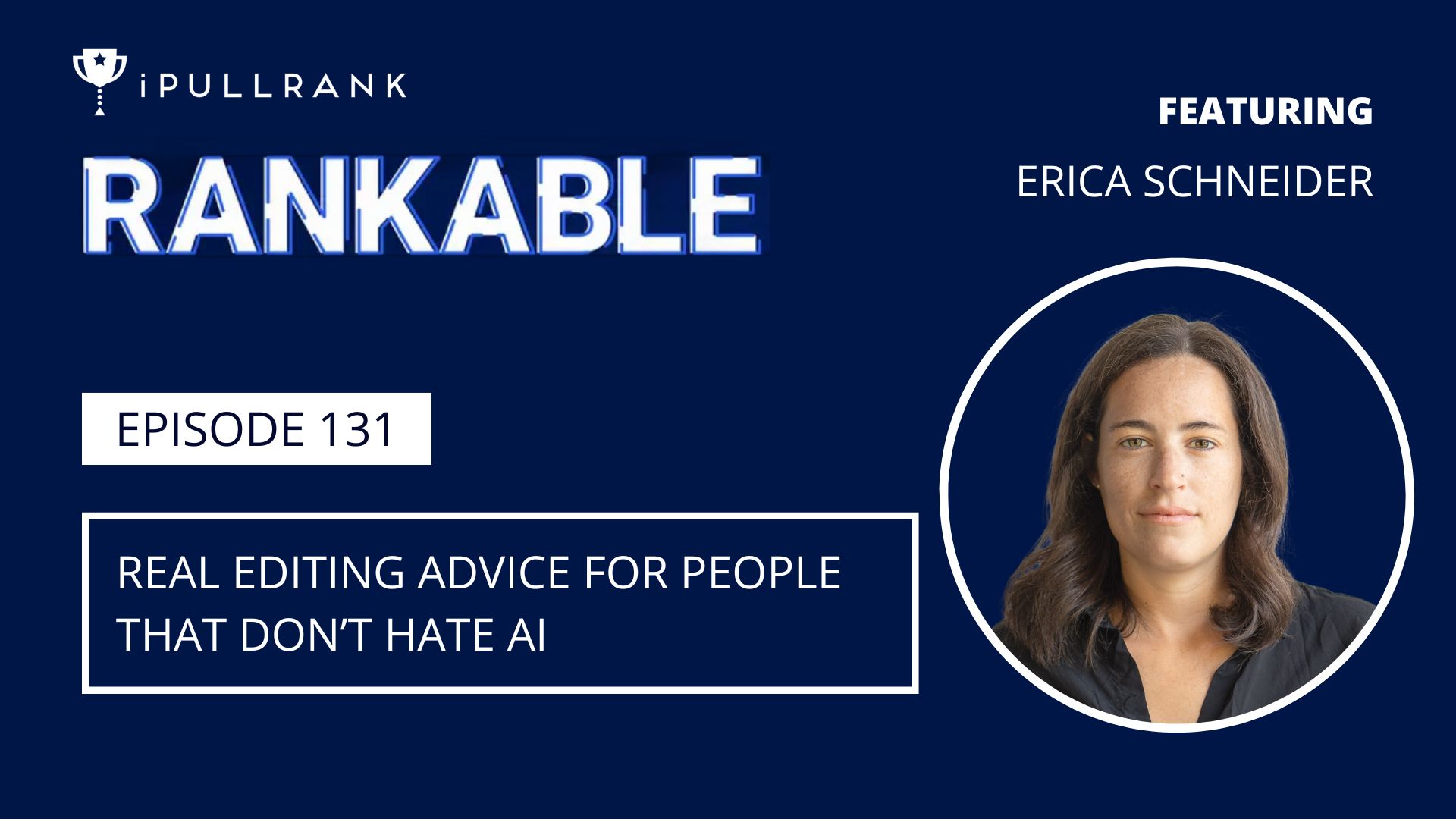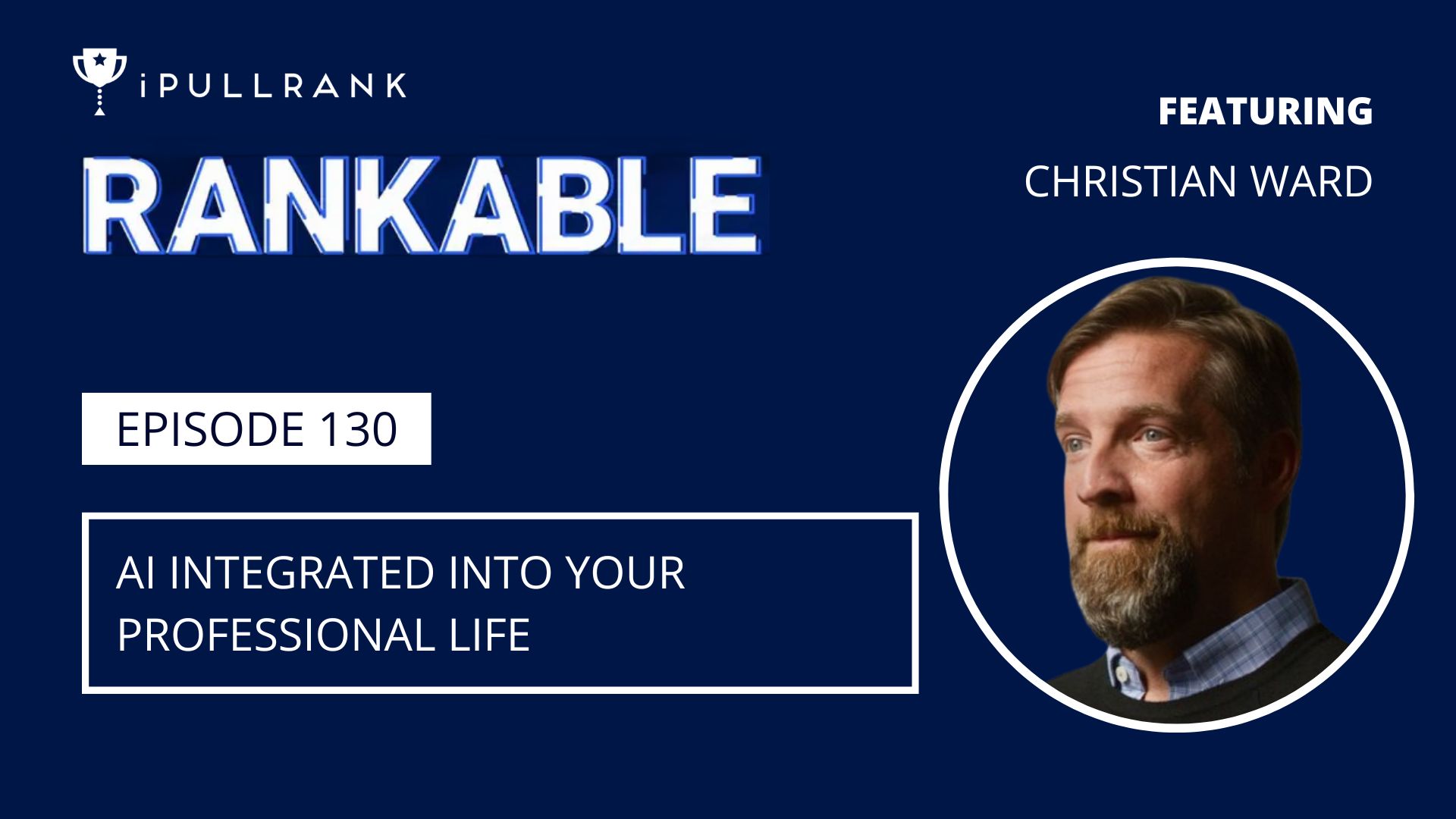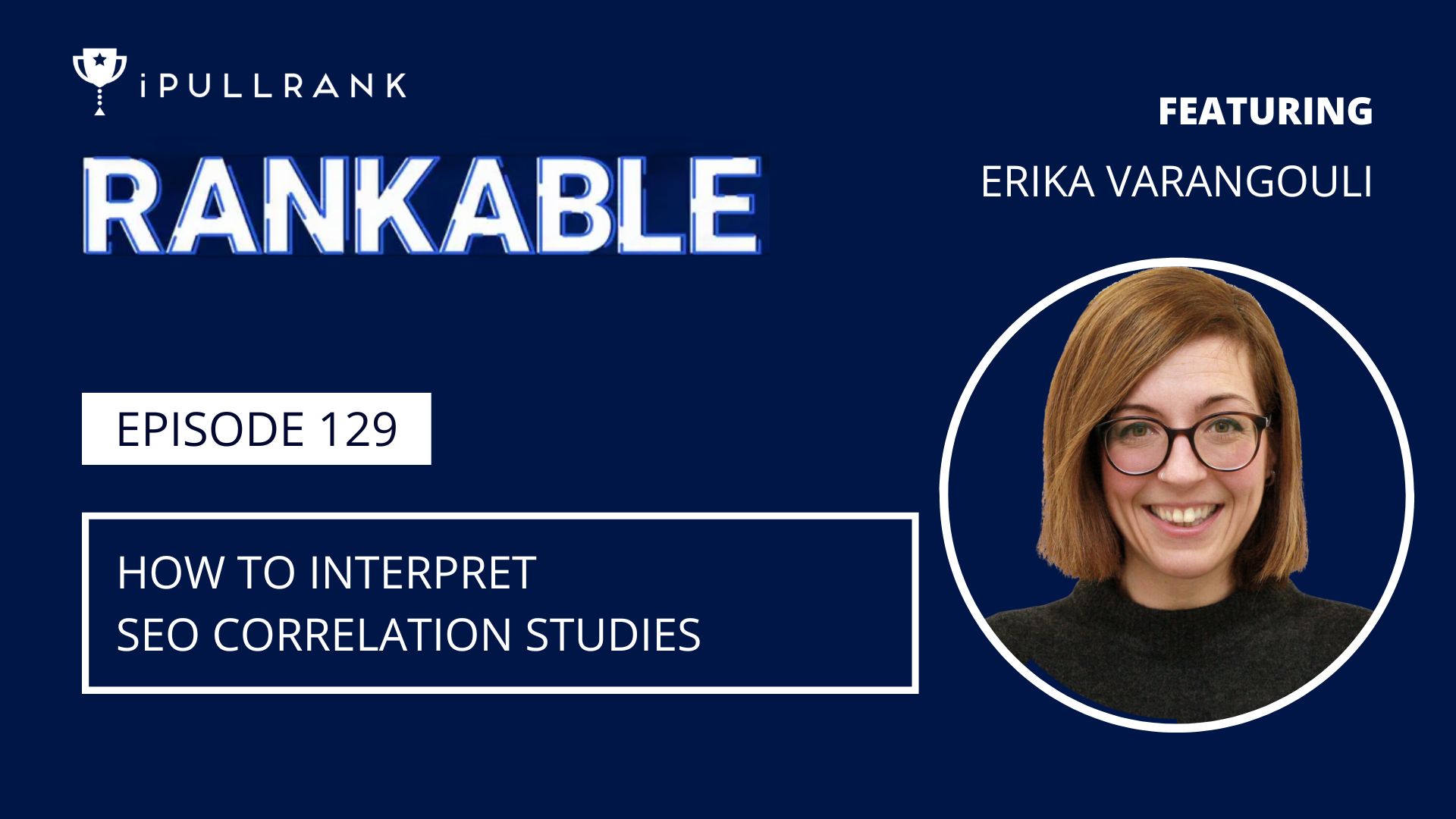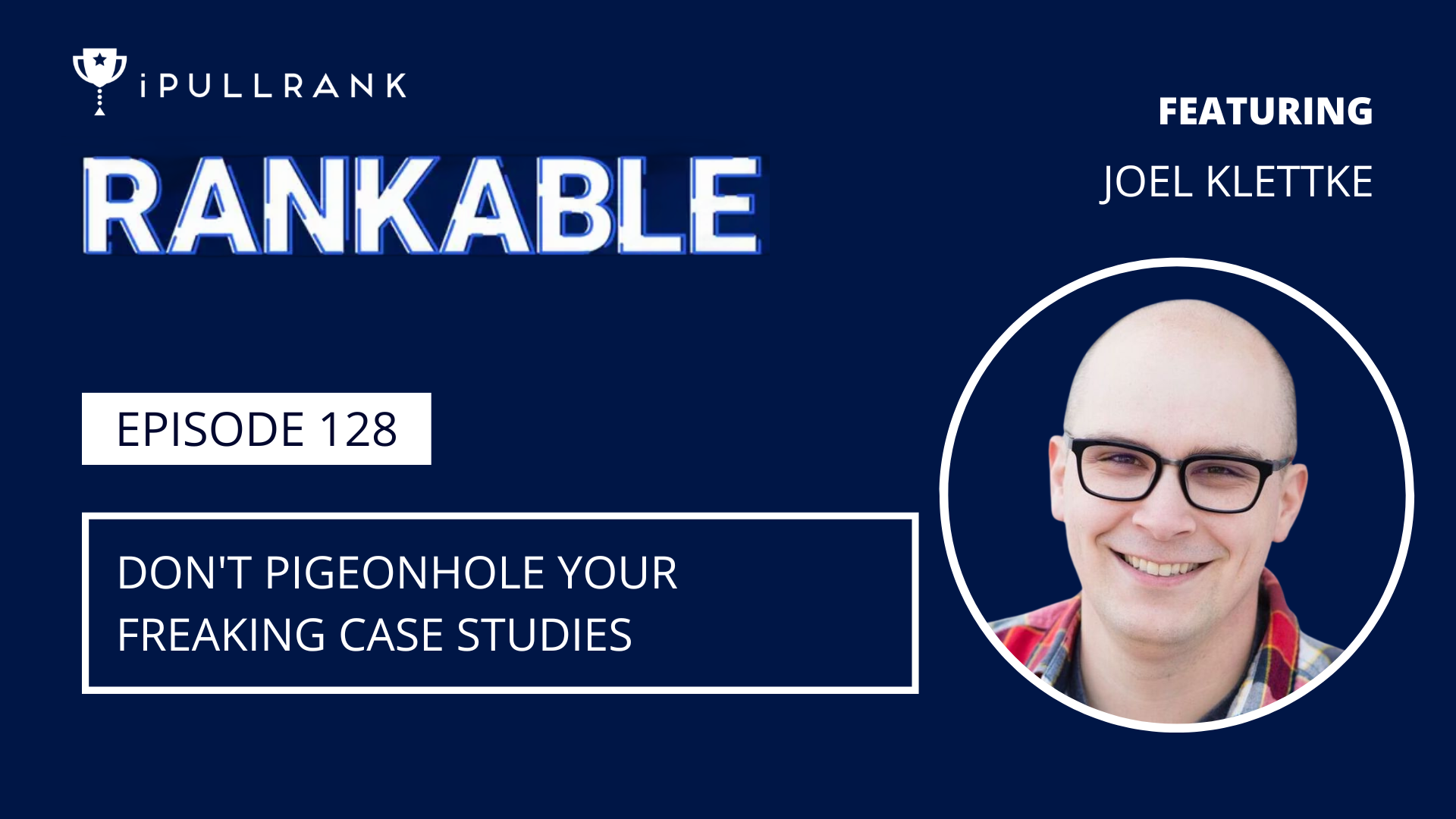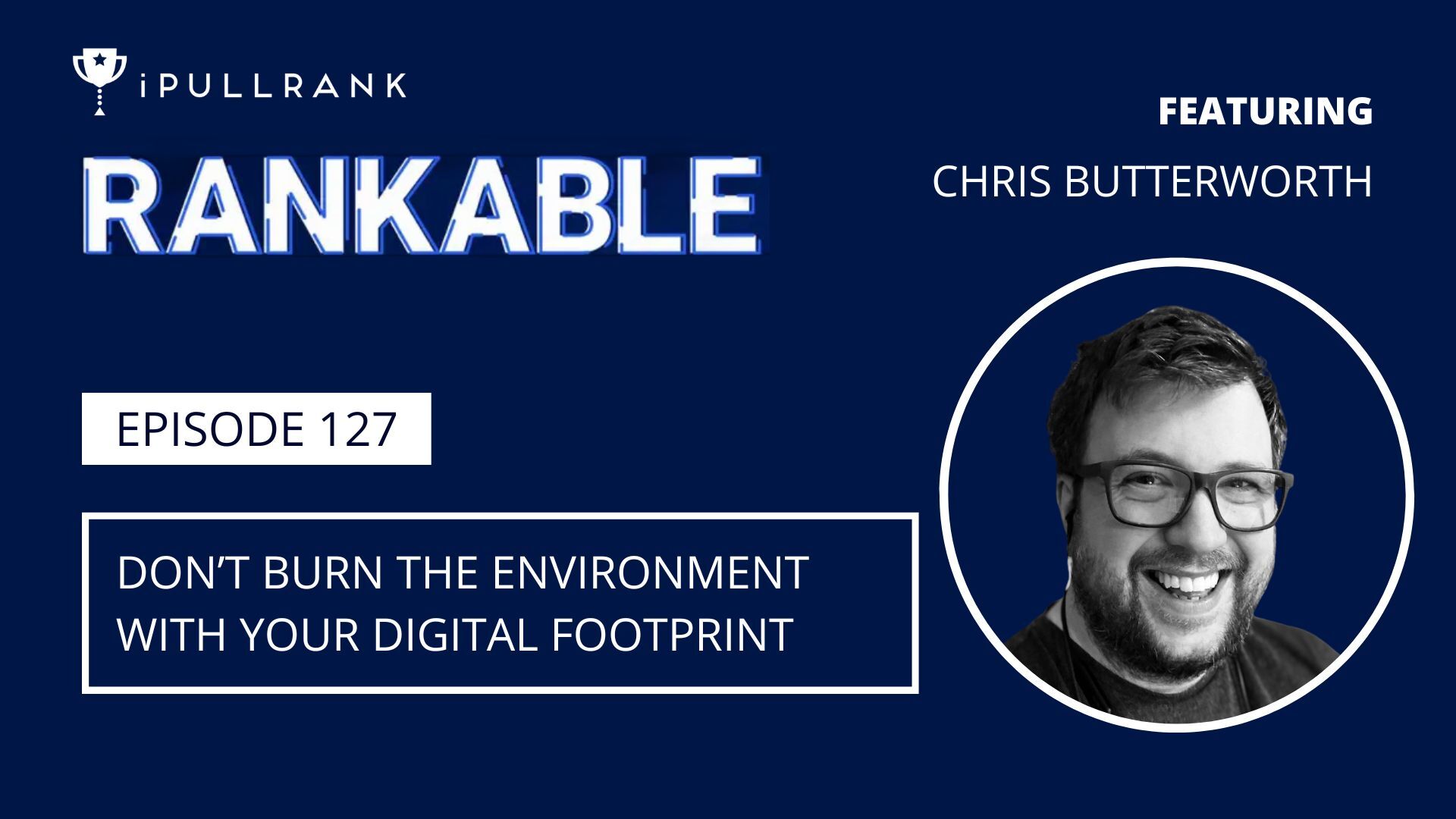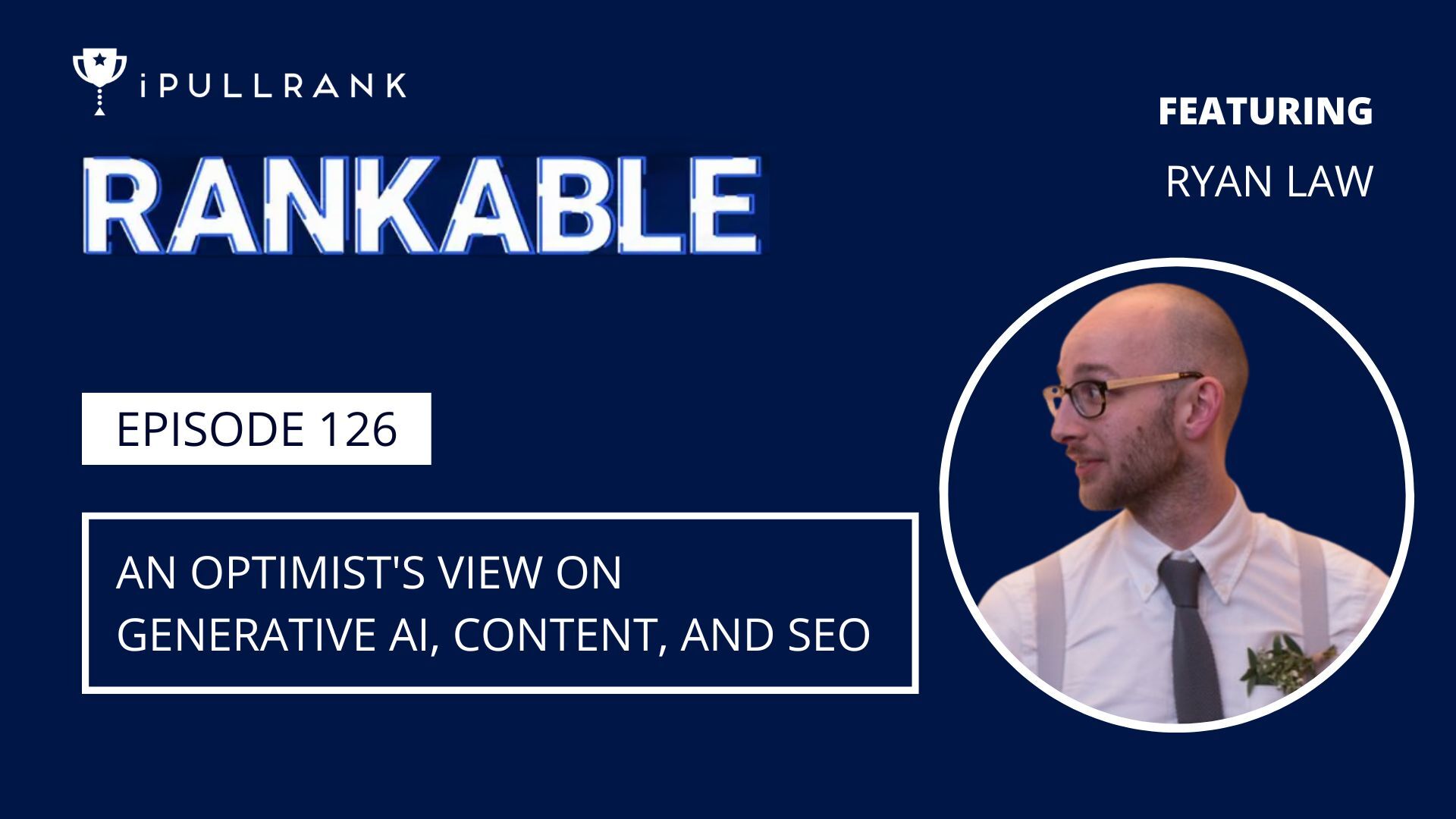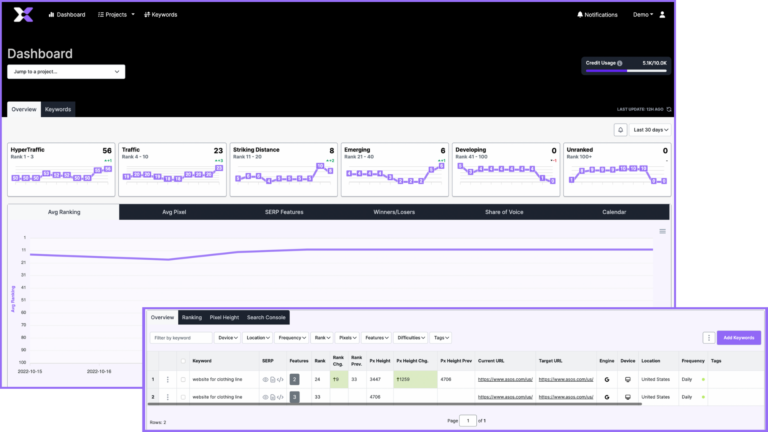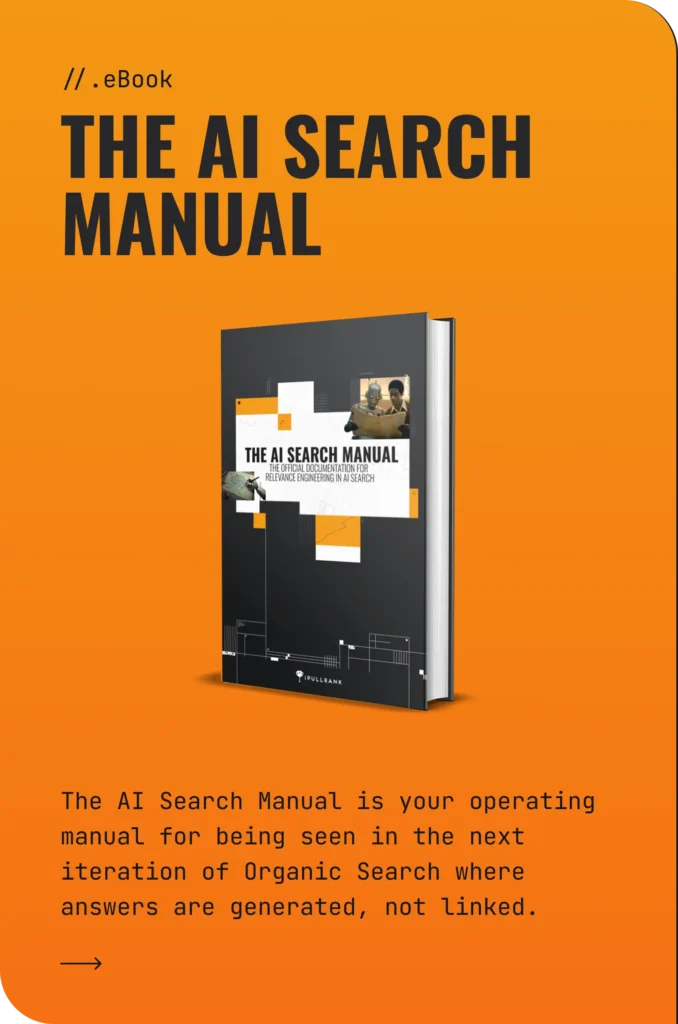The SEO Weekly
Don’t Piss Off the SEO Community - Episode 78
Where queries are weird, advice is controversial, and everything depends.
What happens when you use GenAI content to ‘steal’ traffic from a competitor and then use it as a marketing message on X? A polarizing discussion around the ethics and value of creating that type of content for organic search at scale.
We also discussed Google’s potential move to using LLMs for quality rating assessments, Google’s 600 billion document index, the DOJ Google antitrust reveal and the implications of how Google includes user behavior to determine rankings.
Also:
- Building GPTs for Keyword Research
- Updates to organization structured data and forums
- Q2 Insights from Media Conglomeration earnings
Host: Garrett Sussman | Demand Generation Manager
Show notes / References:
Google/SERP Updates:
The 2023 November Core Update has finished rolling out
The roll-out of the November core update is now complete.https://t.co/geIJA2Bg8g
— Google Search Central (@googlesearchc) November 28, 2023
New Organization Markup – Google
Today we're expanding our support for Organization markup, including validation support in the Rich Results Test. In addition to logo markup, you can now provide other organization details for use in knowledge panels, like address, contact information, and various business… pic.twitter.com/uQ3wYNaOV0
— Google Search Central (@googlesearchc) November 29, 2023
New Forum and Profile Markup – Google
Today we are announcing support for discussion forum and profile page structured data on Google Search, including new reports in Search Console. Learn more: https://t.co/dgNITIpnRx pic.twitter.com/eG8CTrMJMs
— Google Search Central (@googlesearchc) November 27, 2023
Join Andrea Volpini of WordLift and Garrett Sussman of iPullRank for an engaging presentation on how you can use AI to effectively classify your website with the structured data that Google (and LLM) wants to see.
Andrea will answer the questions:
- Why ontologies for SEO?
- What is the role of semantic retrieval and Google’s Knowledge Graph in SGE?
- Why do we still need structured data?
Google’s 2023 Search quality rater guidelines update: Here’s what changed – Lily Ray – SEL
Lily outlines some recent updates to Google’s Search Quality Rater Guidelines, focusing on:
- Enhanced emphasis on user intent and meeting user expectations.
- Specific guidelines for rating forums and Q&A pages, particularly new or combative content.
- Added insights on how user location influences query understanding.
- Expanded definitions of ‘Minor Interpretations’ of queries.
- Clarifications on ‘Know Simple’ and ‘Do’ queries.
- Refinement of user intent classifications.
- Examples showcasing Google’s SERP features that effectively meet user needs.
Big Takeaway: Prioritize creating user-centric content that aligns with Google’s evolving standards on user intent and quality, ensuring your content is both relevant and valuable in search results.
Quality rater and algorithmic evaluation systems: Are major changes coming? – Dawn Anderson – SEL
Dawn reports a big shift in search algorithms: Bing is leading a move from human evaluators to AI in refining search results. This change could impact how often and how search engines update. While this could revolutionize search result refinement, Anderson raises concerns about maintaining quality and avoiding bias in AI-driven evaluations.
Big Takeaway: Adapt to AI-centric search algorithms by focusing on nuanced, context-rich content. Prioritize understanding and integrating user intent and experience in your SEO strategies.
Google’s Patent Behind Google SGE, Explained – Juan González Villa – USEO
Juan González Villa uncovered a patent for Google’s SGE by looking for Google Patents of Google Engineer Steven Baker who was mentioned in the DOJ’s Antitrust Trial.
🔴 BREAKING: Here's Google's patent behind Google's SGE, their experimental search engine with AI generated results.
— Juan González Villa (@seostratega) November 29, 2023
This patent was filed on March 20th, a few weeks before the first announcement and beta release of SGE.
Here's how SGE works, according to the patent... 🧵⤵ pic.twitter.com/VqmX9Ef7Fs
Here are the key aspects of the SGE patent:
- Use of Large Language Model (LLM): The system uses an LLM to generate natural language summaries in response to user queries.
- Steps in Generating Summaries:
- Receiving user queries.
- Selecting relevant search result documents.
- Generating content snippets from these documents.
- Processing snippets with an LLM.
- Creating a natural language summary.
- Rendering the summary on the client device.
- Multiple AI Models: SGE can dynamically select from various generative models, including multiple LLMs, to optimize response accuracy and efficiency.
- Source Verification Links: Summaries include links to search result documents that verify the information, enhancing user trust and understanding.
- Confidence Annotations: The system can apply confidence scores to summaries, indicating the reliability of the information provided.
- Connection to Featured Snippets: Key engineers involved in SGE previously developed Google’s Featured Snippets, suggesting continuity in Google’s approach to question-answering and summary generation.
Big Takeaway: Google’s SGE represents a significant shift in search result generation, offering a more nuanced, AI-driven approach. Get your SGE Threat Report for your own organic traffic at risk.
Jake Ward brags that he stole traffic using generative AI content and SEO Twitter explodes.
We pulled off an SEO heist that stole 3.6M total traffic from a competitor.
— Jake Ward (@jakezward) November 24, 2023
We got 489,509 traffic in October alone.
Here's how we did it: pic.twitter.com/sTJ7xbRjrT
JH Scherck figures out what site he’s referring to. Causal, a site for excel tips and support.
If you do a second of digging, it's obvious this is @CausalHQ and if you do a bit more digging - it's obvious their content is garbage: no visual aids, just pure autogenerated crap.
— JH Scherck (@JHTScherck) November 26, 2023
Would be amazed if this brought in enough paying users to cover the lift to get this live. https://t.co/4EJz64rP9v pic.twitter.com/JgkK4DiebM
Ross Hudgens sees that Google has already begun to de-index and penalize the site.
Google has stolen this traffic back.
— Ross Hudgens (@RossHudgens) November 29, 2023
According to Ahrefs, traffic is falling off a cliff.
I do not see any rankings present, and using a site: search, only the homepage is currently indexed.
Do not embarrass Google. https://t.co/qLVVW50Ehi pic.twitter.com/iNOOnkc9MZ
Sports Illustrated Published Articles by Fake, AI-Generated Writers – Maggie Harrison – Futurism
Sports Illustrated’s recent strategy of using AI-generated writers and content, as revealed by Maggie Harrison, signals a troubling trend in digital publishing.
The magazine, once known for its award-winning journalism, has been generating articles under fictitious bylines, complete with AI-generated headshots. These articles, often of questionable quality and lacking authenticity, were quietly removed following inquiries, suggesting a lack of transparency and ethical consideration.
This approach not only undermines the credibility of SI but also raises serious questions about the ethical use of AI in journalism
Big Takeaway: Authenticity and transparency are key. AI can be a useful tool, but it should never replace human ingenuity and ethical considerations in content creation. As a marketer, it’s crucial to balance technological advancements with ethical practices to maintain credibility and trust with your audience.
The Ethical Use of AI in Content Creation and SEO: Balancing Innovation and Integrity – Valentina Izzo – iPullRank
Valentina tackles ethical AI in SEO and content creation. She zeroes in on the need for quality data, expert input, and ethical practices like bias prevention and originality in AI. The bottom line: Smart AI use boosts marketing, driving better content and search success.
Big Takeaway:
For marketers, the fusion of AI and ethical practices is crucial. It’s about harnessing AI’s power not to replace human creativity but to enrich it, ensuring content remains authentic, fair, and legally sound.
Using ChatGPT’s Custom “GPTs” for SEO and Keyword Research – Paul Shapiro
Paul goes step-by-step and explains how to build Custom GPTs that can help you get accurate search volume into ChatGPT via an API. In his example, he creates an ‘Action’ to directly include search volume via DataForSEO.
The process, requiring a ChatGPT Plus subscription, involves setting up a GPT, configuring system instructions, and integrating the third-party API. By personalizing ChatGPT with Actions, marketers can access accurate search volume data and insightful SEO analytics, streamlining keyword research and strategy formulation.
Big Takeaway: Embrace custom ChatGPT models to refine your SEO strategy with more accurate data and personalized insights. Remove the hallucinations with real 3rd party data.
General SEO:
Elephant in the room – Kevin Indig – Growth Memo
Kevin shares his important perspective shift on SEO in the context of the antitrust trial against Google: user behavior is the true driver behind Google’s search ranking systems, not just content or technical aspects. Google relies heavily on user interactions like clicks and query rewrites to gauge what users seek.
Key Takeaway: Embrace a user-centric approach in SEO. Prioritize understanding and addressing user needs and behaviors to improve search rankings. You need users to click through and stay on your site because it serves search intent matters.
“It’s likely Google’s systems have evolved a lot, especially over the last 3 years, and the antitrust documents only go up to 2020. At least until 2020, Google distracted us from the key ingredient of Search with documentation about content and technical SEO like a skilled magician. User behavior, not content, is the source of Google’s magic. For a long time, Google has been logging events like clicks, hovers, scrolls, swipes, pauses, and query rewrites to understand what users want. (source)”
Google’s Index Size Revealed: 400 Billion Docs (& Changing) – Cyrus Shepard – Zyppy
Cyrus recently shed light on Google’s index, revealing it holds an estimated 400 billion documents, a curated selection from trillions of web pages. This figure, shared in the USA vs. Google trial, highlights a key insight: Google’s index is constantly evolving, even downsizing, based on content relevance and efficiency.
Big Takeaway:
For marketers, this means strategizing to meet Google’s indexing criteria is more crucial than ever. Focus on creating content that’s not just relevant but also concise and fresh. Staying ahead in this dynamic indexing landscape is essential for maximizing your digital presence.
“Sometimes when Google doesn’t index a page, it does so because it doesn’t believe it’ll be useful to users.
If Google isn’t indexing your pages, you may need to evaluate your site’s technical SEO, the usefulness of the content, links to your site, and your user engagement, among other factors.”
11 Author Page Examples that Brilliantly Demonstrate E-E-A-T – James Brockbank – Digital Loft
James jumps into the author page conversation in the context of E-E-A-T. Many websites don’t do enough with these pages. They should show more than just the writer’s name and their articles. Good author pages help show that your content is trustworthy and written by experts, which Google really likes. James gives examples of 11 great author pages to help you make yours better.
Big Takeaway:
Make sure your website’s author pages are informative. They should tell more about the writers, like their background and skills. This helps build trust with your readers and improves how Google sees your website. It’s a smart move for your online marketing efforts.
“Your site’s author pages are one of the best ways you can demonstrate on-page E-E-A-T signals at the author level.”
Detailed Q2: Analysing The SEO Playbook of Digital Goliaths In-Depth, Every Quarter – Glen Allsopp
Glen Allsopp’s Detailed Q2 report provides a comprehensive analysis of the latest SEO strategies employed by major digital players including a few fascinating insights:
- Digital Brands: Their openness about link-building strategies contributed to a 50%+ growth in traffic and revenue.
- Wag!: Successful pivot to pet food affiliate marketing, generating about $500,000 per month.
- CarParts.com: Developing an app to reduce reliance on Google, already generating $2M in revenue.
- Hearst’s Puzzmo: Challenging the NYT’s dominance in online puzzles, rapidly gaining visitors.
- Nextdoor: Employing generative AI to create 300,000 pages of SEO content, a significant digital strategy shift.
Takeaway for Marketers: Diversification and transparency in digital strategy, such as innovative link-building and leveraging AI for content creation, are key to thriving in the ever-evolving SEO landscape.
Topic Maturity, Information Gain, and Search Intent ft. Bernard Huang – Rankable Ep. 124
Content strategy is the new SEO. According to Bernard Huang, co-founder of Clearscope. In his opinion, Google’s SGE will disincentivize copycat content. Search cannibalization is nothing new. People will still gravitate to some form of search. That’s why content strategy is the new SEO.
Your Brand, Search Intent, and the Content Arms Race ft. Victor Pan – Rankable Ep. 125
Victor Pan discussed the data void in the context of search intent and how it can be used to create content that ranks well.
Victor also discussed the importance of brand in search. He said that brands that are well-known and trusted are more likely to rank well in search results. This is because Google is more likely to trust content from brands that it knows and understands.
Rank Tracking: Now with your content relevance score

Join Garrett Sussman each week as he pulls out all of the biggest and smallest stories from the past week that touch the world of SEO.
Get the scoop on what’s happening to Google, game-changing strategies for SEOs, and the people that you should have on your SEO radar.
